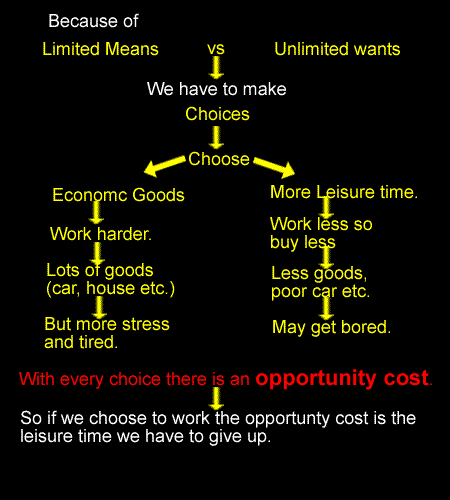Scarcity |
| Scarcity
is a key problem in economics for both producers and consumers. |
| |
Consumers and
scarcity |
|
Consumer wants, including needs are
unlimited.
Consumers tend to want as much as they can get.
Needs
are things we must have to
survive. They include food, shelter, warmth.
Wants
are things we desire, we would like to have them but may not need them
to survive.
|
| Consumer
means i.e. incomes,
skills and time are limited. |
| |
| The
problem is unlimited wants but limited means. |
| |
| Unlimited
wants |
| Needs
e.g. food, clothing, shelter, love. |
| Plus |
| Other
wants |
| These
are unlimited e.g. cars, holidays, boats, furniture - all goods and services
are included. |
| |
| Limited Means
- these are our ability to get / obtain
the goods and services we would like to have (our unlimited wants). |
| The
main ones are: Time
- the time we have to fulfill our needs and wants.
Income
- the money we have available to fulfill our needs and wants.
Skills
- our personal attributes and abilities
that we are born with. Education and training help us to enhance our
skills and fulfill our potential.
But there may also be other ones such
as our family (whanau) or friends. |
 |
| |
| How
does scarcity apply to consumers? |
|
| |
|
|
| |
| What
are wants and needs? |
|
| |
|
|
| |
| What
is the difference between an economic and a free good? |
|
| |
|
|
| |
Choice |
| Because
wants are unlimited and means for getting them limited, then
choices
must be made. |
| Example: |
| Amy
has just receive a $500 from her parents. She could spend it on a new
bike or a new stereo, but not both as she doesn't have enough money. Amy
has to make a choice between the bike and the stereo as she doesn't have
enough money (limited means) to buy both. |
| |
| Why
must consumers make choices? |
|
| |
|
|
| |
Opportunity
cost |
| This
is the name for the next best thing you give up in order to have the good
or service you choose.
It is the next best alternative forgone. |
| Example: |
| Amy
chooses the new bike but goes without stereo. The
opportunity cost
is the new stereo. |
| |
| Sean
would like to go on a holiday to Fiji, but he also wants to buy
a new computer. His parents want him to save the money for going
to university. Sean would really like a new computer but decides
to listen to his parents. What
is the opportunity cost? |
|
| |
|
|
| |
| What
is Opportunity Cost? |
|
| |
|
|
| |
Values
in choice and decisions |
Choice
Choice depends on personal preferences. Different people will
choose differently. |
| Why? |
| Our
decisions are influenced by: |
- Upbringing
-how you are taught to behave.
|
- Culture
- an Asian student may choose differently from a New Zealander.
|
| |
- Age
and whether male or female.
|
| |
| |
- Your
income - very important.
|
|
| |
| Values
- these are things we
hold to be important. |
All
these influences give people values e.g.
Honesty; thought for others; sense of justice and fair play; Thrifty (not
wasting money); hardworking. Values are things people hold to be important. |
These
values affect
 |
decisions and choices |
| |
| Example: |
 |
| |
| |
| |
| Example: |
| Grace
and Scott are deciding what they will have for dinner Grace, who is a
vegetarian wants to eat at a local restaurant which services healthy meals
and vegetarian meals. Scott prefers cheaper meals such as fast food and
hamburgers and so would like to eat at Mo's Burger. |
| |
| What
influences could affect how they decide?
|
|
| |
|
|
| |
| Name
two values that would affect their decision.
|
|
| |
|
|
| |

